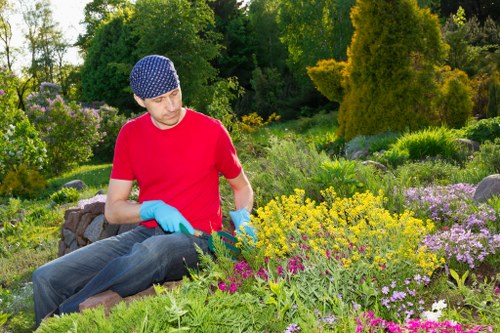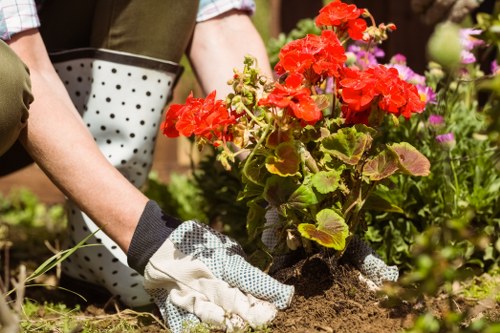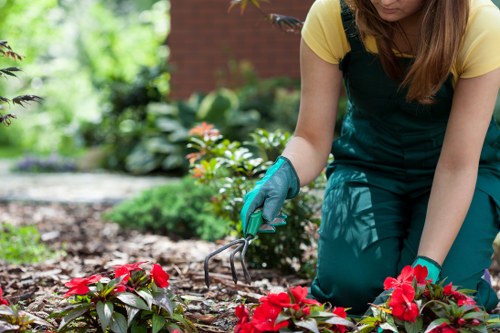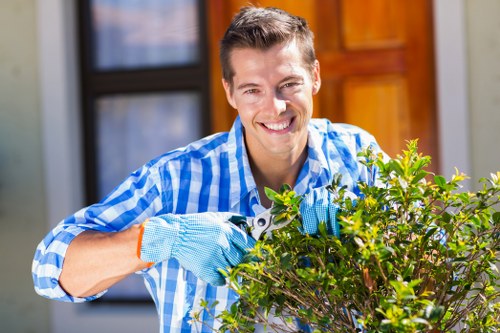Garden Maintenance Richmond
Introduction

Welcome to our comprehensive look at garden maintenance Richmond. Whether you are a homeowner or a business owner, keeping your garden well maintained can transform your outdoor space into an oasis. In Richmond, where seasons change and nature flourishes, regular care and proper landscaping are key to ensuring that your garden remains a safe and beautiful space to relax and enjoy.
Gardening is more than just watering plants or trimming bushes; it is an art and a commitment to nurturing Nature. Garden maintenance involves a mix of planning, regular work, and seasonal adjustments. This article explores why good garden upkeep is essential and how it can increase curb appeal, improve the quality of life, and even add value to property in the Richmond area.
In this article, we will delve deep into various aspects of garden care. We will discuss simple techniques for beginners, as well as provide insights for seasoned gardeners. Our goal is to offer practical advice, local context, and step-by-step instructions that are easy to understand, ensuring that anyone can enjoy a vibrant garden throughout the year.
The Importance of Regular Garden Maintenance

Regular garden maintenance is essential in Richmond due to our unique climate and the changing seasons. The local weather patterns demand that gardens be regularly inspected and cared for. Routine care keeps pests at bay and helps in detecting plant diseases early. By scheduling periodic maintenance, homeowners can avoid large-scale problems that might otherwise ruin a beautiful garden display.
Moreover, a well-kept garden enhances the overall appearance of your home. In Richmond, many neighborhoods take pride in their gardens, as they represent a harmonious blend of natural beauty and modern design. Seasonal pruning, proper fertilization, and consistent watering are all part of this process. This improved curb appeal can also boost property values and foster a sense of community pride.
Keeping a garden in top condition is not only good for aesthetics but also beneficial for environmental reasons. Healthy gardens contribute to better air quality, support local wildlife, and create micro-habitats for birds and insects. With initiatives to support urban green spaces on the rise, regular garden maintenance is part of a larger commitment to a sustainable future in Richmond.
Essential Garden Maintenance Tasks

There are several fundamental tasks that every gardener should include in their weekly schedule. These include weeding, watering, mulching, and fertilizing. Each task plays a critical role in keeping your garden thriving. Weeding helps reduce competition for nutrients, and keeping the soil healthy is central to strong plant growth.
Watering is a task that cannot be understated. Whether you use a drip system or hand-watering, ensuring that plants receive adequate moisture is crucial during the hot Richmond summer months. Moreover, using rainwater collection systems can be both an eco-friendly and cost-effective method to maintain your garden.
Additional tasks include pruning overgrown plants, removing dead foliage, and controlling pest populations. For many residents in Richmond, the combination of technical knowledge and intuition for plant care results in seasonal improvements that make garden maintenance a rewarding hobby as well as a necessity.
Tips for Sustainable Garden Maintenance in Richmond

Adopting sustainable garden practices is not only beneficial for your plants but also for the environment. One of the first steps in sustainable garden maintenance is the proper use of organic fertilizers. These natural substances help maintain soil nutrient balance without using harsh chemicals that may harm local wildlife.
Another tip for sustainable garden care is the integration of native plants. Richmond offers rich biodiversity, and by choosing species that are naturally adapted to the local climate, gardeners can achieve more resilient landscapes. Native plants require less water, are more resistant to local pests, and add to the overall charm of your garden.
Mulching is an inexpensive way to conserve moisture and control weeds. Spread organic mulch across garden beds to improve soil health and boost the natural defenses of your plants against varying weather conditions. Combining these techniques not only results in a healthier garden but also contributes to conserving the region’s natural resources.
Local Garden Trends and Community Engagement in Richmond

Richmond is home to many dedicated gardeners who continuously share tips and trade ideas in various local forums and community gardens. In recent years, local trends have moved towards creating eco-friendly spaces, with a focus on sustainable practices and organic methods. Residents embrace innovative techniques such as xeriscaping and using recycled materials for garden decorations.
The strong sense of community in Richmond encourages many to participate in neighborhood projects and public garden initiatives. Community gardens not only provide local produce but also serve as a meeting place where neighbors share their passion for nature and sustainable living. It is common to see community workshops focused on garden planning, natural pest control, and seasonal planting.
Local businesses frequently collaborate with garden maintenance professionals to offer seasonal discounts and workshops. These events are designed to educate the public on ways to keep gardens healthy and vibrant. Whether you are a seasoned gardener or a beginner, engaging with your neighbors can provide new ideas and a support network to improve your outdoor spaces.
Exploring Nearby Areas and Their Unique Garden Maintenance Features

Richmond is not an isolated hub; it sits in a vibrant network of communities, each with its own charm and garden maintenance traditions. Let’s take a look at some of the nearby areas that enrich the local culture of garden care. Chesterfield is known for its sprawling estates and meticulous garden designs. The emphasis here is often placed on ornamental shrubbery and expertly landscaped lawns.
Henrico County boasts a mix of urban and rural gardening practices. Residents balance modern design trends with traditional garden care, making it a place where innovative ideas meet long-standing horticultural practices. In Henrico, sustainable garden tips and water conservation methods have become a priority as part of community initiatives.
Ashland offers a more historic perspective, with gardens that reflect the traditions of past generations. Here, garden maintenance is deeply connected to preserving local history. Many homeowners in Ashland excel in restoring old garden beds and using heirloom plant varieties, which gives the area a distinct character that resonates with tasteful nostalgia.
Further Local Areas and Their Garden Maintenance Characteristics

Bon Air is another community where garden maintenance is celebrated. With tree-lined avenues and private gardens, the area places a high value on seasonal beautification and the preservation of natural habitats. The local climate here makes organic gardening practices especially popular, and homeowners often collaborate to create eco-friendly outdoor spaces.
Glen Allen is emerging as a hub for garden enthusiasts who love blending artistic design with sustainability. Residents here are experimenting with vertical gardens, raised beds, and even urban farming. Modern techniques are paired with traditional gardening methods to create vibrant, productive gardens, making Glen Allen a community to watch in terms of innovative garden maintenance.
In Mechanicsville, the pace of life is relaxed, and garden maintenance is seen as an extension of daily living. The simplicity of routine maintenance—cleaning up fallen leaves in autumn and applying winter mulch—gives Mechanicsville gardens a natural charm. Community gardens in this area also support local food banks and promote social engagement.
Final Thoughts and Embracing the Garden Maintenance Lifestyle
As we come to the end of our detailed discussion on garden maintenance in Richmond, it is clear that a blend of dedication, sustainable practices, and community involvement is key. Whether you are maintaining a small urban garden or a large estate, the principles of garden care remain the same. Consistent effort and attention to detail can help your garden thrive through all seasons.
Adopting a garden maintenance lifestyle in Richmond means respecting nature and investing time in your outdoor sanctuaries. It is not just about keeping up appearances but also about creating a space that fosters calm and encourages creativity. In every trim, every watering session, and every seasonal adjustment, there is a chance to reconnect with nature.
For residents and garden enthusiasts alike, there are plenty of resources available. Local workshops, online forums, and community events offer practical advice and inspire individuals to improve their garden spaces. Let this guide serve as a starting point to explore the many opportunities for making your garden a true masterpiece in Richmond.
Frequently Asked Questions
- Q: How often should I water my garden in Richmond?
A: Water your garden early in the morning or late in the evening, generally two to three times a week depending on the season, though adjustments may be needed during extremely hot weather. - Q: What are the best local plants for a Richmond garden?
A: Native plants such as Eastern Redbud, Virginia Bluebells, and Black-eyed Susan are well-suited to the climate and can thrive with minimal maintenance. - Q: How can I manage pests in my garden in an eco-friendly way?
A: Use organic pesticides, introduce beneficial insects like ladybugs, and employ companion planting to naturally deter pests without harming your garden’s ecosystem. - Q: Are there any seasonal maintenance tips for Richmond homeowners?
A: Yes, in spring focus on soil preparation and planting, summer on regular watering and mulching, autumn for pruning and leaf cleanup, and winter for protecting delicate plants from frost. - Q: How can I make my garden more sustainable?
A: Incorporate organic fertilizers, use recycled garden materials, and select native plants that reduce water usage and require less chemical intervention.

